

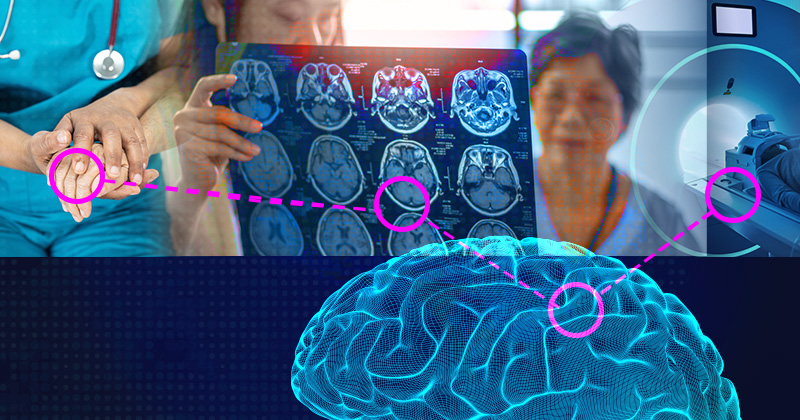
Transformational gift fuels discovery
Photos by Kathy F. Atkinson and Ashley Barnas Larrimore | Photo illustration by Jeffrey C. Chase September 15, 2025
Delaware Community Foundation invests $13M in UD to advance Alzheimer’s research
Tamara Smith was traveling to Disney World with her family in 2018 when her 70-year-old mother needed to run to the pharmacy. She got in the car and suddenly couldn’t remember how to drive.
“That set off a big alarm for me,” Smith said.
Soon after, her mom had trouble completing simple tasks like booking flights and creating evites on the computer. That same year, her mother was diagnosed with Alzheimer’s disease (AD). As the disease has progressed, her mom can no longer carry on a conversation.
“Watching my mom go through it has been scary,” she said. “I feel like I’m grieving who she was.”
It’s also made Smith more aware of her own risk. As someone who’s prediabetic, she faces an increased risk of developing Alzheimer’s. That concern led her to enroll in a study at the Delaware Center for Cognitive Aging Research (DECCAR) at the University of Delaware, which is now expanding significantly thanks to a $13.1 million grant from the Delaware Community Foundation (DCF). The five-year investment, one of the largest in state history for Alzheimer’s research, will support the expansion of a statewide prevention study, enable the purchase of a state-of-the-art MRI machine, and drive discovery of new diagnostic tools and treatments.
“This transformational gift will significantly expand Alzheimer’s research throughout the state,” said Christopher Martens, director of DECCAR. “It will also help grow the number of researchers in Delaware focused on Alzheimer’s disease, promoting an interdisciplinary approach.”
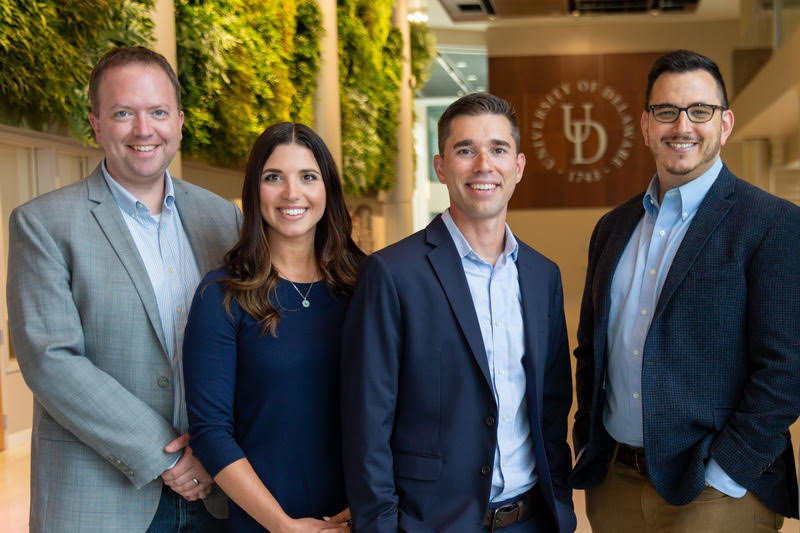
Bringing together researchers from multiple fields to collaborate on a critical challenge like Alzheimer’s disease is a key strength of the University of Delaware, said Interim President Laura Carlson.
“Every one of us has a family member or friend who has been deeply affected by Alzheimer’s. I’m proud that UD is working better to understand this terrible disease and partnering with others throughout the state to work on its prevention, diagnosis and treatment,” Carlson said. “We are grateful to the Delaware Community Foundation for their support, which allows us to escalate our research and expand our community outreach.”
“No one has to look very far afield to witness and understand the tragedy of Alzheimer’s, and the research supported by this grant will help UD researchers come ever-closer to uncovering life-improving and life-saving solutions,” said Stuart Comstock-Gay, President and CEO of the Delaware Community Foundation (DCF). “The grant was provided through the generosity of late Paul H. Boerger, who made a substantial legacy gift to the fund he had established at the DCF in his lifetime, and his foresight will help so many.”
DeLSAP: Understanding Alzheimer’s risk over time
The grant will fuel the expansion of DECCAR’s flagship research project – the Delaware Longitudinal Study for Alzheimer’s Prevention (DeLSAP). Run by Martens, associate professor of kinesiology and applied physiology (KAAP), and Matthew Cohen, associate professor of communication sciences and disorders (CSCD), in the College of Health Sciences, the observational study explores how health, lifestyle, and biology influence dementia risk over time and helps identify early signs of cognitive impairment. With over 100 participants currently enrolled, the study aims to grow to 500 over the next five years.
“With my mom, we didn’t catch it early enough to stop the deterioration,” Smith said. “I want to confront it, be a part of the solution, and take steps to prevent Alzheimer’s.”
Nick Rizzi, an applied physiology doctoral candidate, was drawn to work on chronic disease while an undergrad at UD. He now works in Martens’ Neurovascular Aging Lab.
“I’m fascinated by how changes in the brain affect the cardiovascular system and vice versa,” Rizzi said. “The DeLSAP has the potential to have a significant impact, and working with this population has taught me that early intervention and lifestyle changes make a difference.”
A blood test for Alzheimer’s
The DCF’s investment is also fueling efforts to develop a new blood test for AD. Zhihao Zhuang, professor of chemistry and biochemistry in the College of Arts and Sciences, is using DeLSAP samples to identify biomarkers that better predict Alzheimer’s progression.
Zhuang, who has studied neurodegeneration for a decade, is shifting focus from amyloid beta, traditionally viewed as the primary indicator of AD, to other proteins.
“Amyloid beta has been the primary research and therapeutic focus, but it may not be the disease’s main culprit,” Zhuang said.
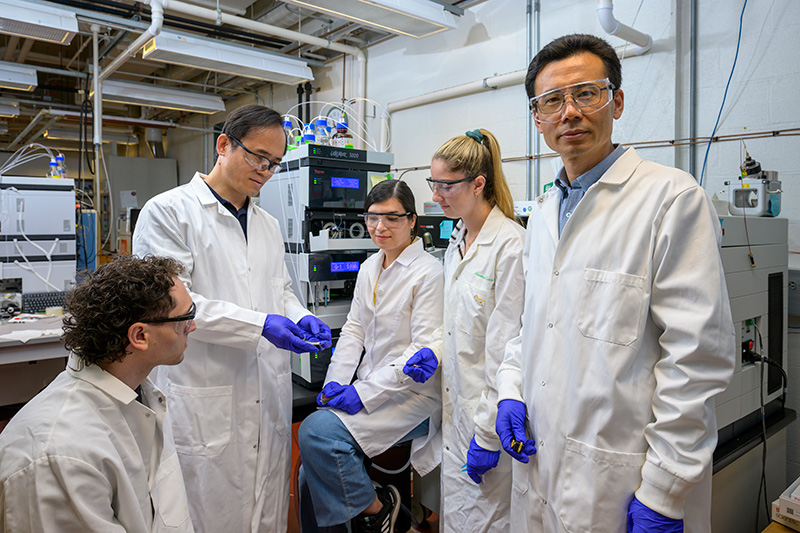
Zeinab Moafian, a fourth-year biochemistry doctoral student from Iran, joined Zhuang’s lab to work on Alzheimer’s research.
“This research is my dream,” Moafian said. “Diagnostic tools that can help patients and physicians are crucial in the fight against Alzheimer’s. We can use biomarkers to diagnose the disease earlier and track its progression; it’s a promising field.”
Martens noted that the blood samples collected today could be key to unlocking future insights.
“Eventually, we will be able to look back at our data and know who went on to develop dementia versus who remained healthy,” Martens said. “Blood samples collected in year one may be useful for predicting disease trajectory.”
Zhuang hopes his research will lead to more reliable biomarkers and better treatments.
“The DCF funding is crucial to kickstarting our high-level proteomics study,” Zhuang said. “It will deepen our understanding of Alzheimer’s mechanisms and pave the way for biomarkers and drug discovery — that’s the exciting part.”
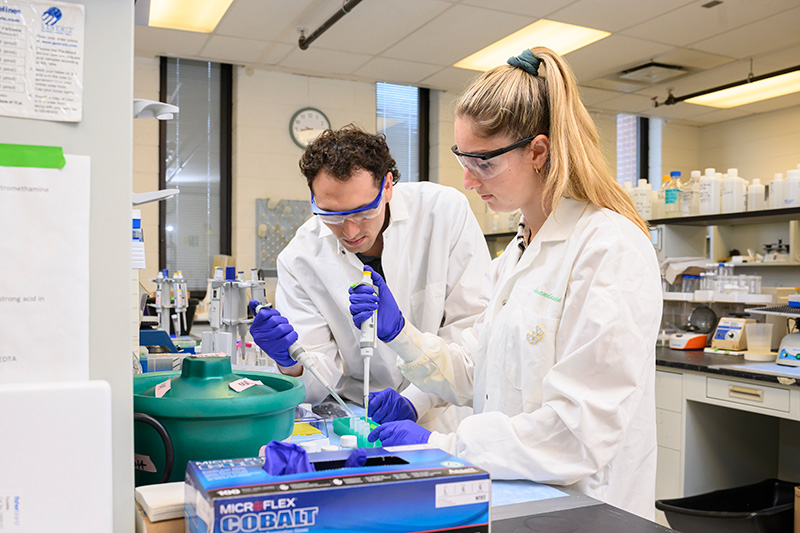
Expanding DeLSAP’s impact
The DCF grant will also help expand the infrastructure needed for cutting-edge research. A new $3.2 million state-of-the-art MRI machine will be installed on UD’s STAR Campus. Curtis Johnson, associate professor of biomedical engineering in the College of Engineering, will use magnetic resonance elastography to explore links between brain stiffness and cognitive impairment.
Other impact projects supported by DCF include an extension of research led by Alyssa Lanzi, assistant professor of CSCD, which builds on a previous NIH-funded study exploring whether subtle language changes can signal early signs of dementia. KAAP Associate Professor Megan Wenner, along with Martens, is studying the role of hormone therapy in Alzheimer’s risk in women undergoing menopause.
“This interdisciplinary research, supported by the DCF, will bring us closer to finding a cure for Alzheimer’s disease and accelerate research and early detection in our state,” Martens said.
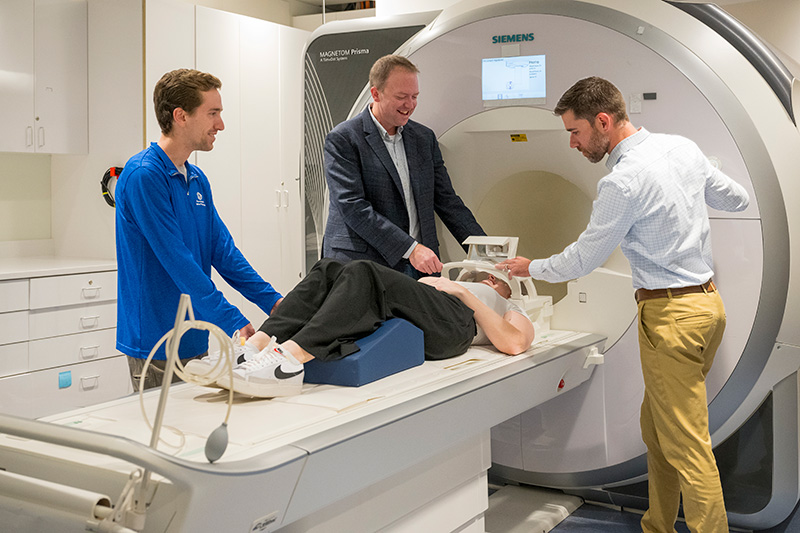
Contact Us
Have a UDaily story idea?
Contact us at ocm@udel.edu
Members of the press
Contact us at mediarelations@udel.edu or visit the Media Relations website

